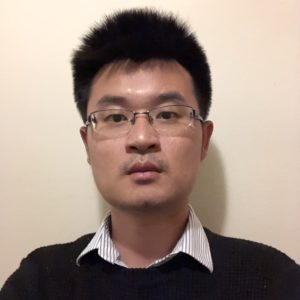Ting Ge is an assistant professor in the Department of Chemistry and Biochemistry at the University of South Carolina. He earned his BS degree in 2007 from the University of Science and Technology of China followed by a Ph. D. degree in 2013 from Johns Hopkins University. Subsequently, he worked as a post-doctoral researcher in the Research Triangle of North Carolina in the USA, first at UNC-Chapel Hill and then at Duke University. He is interested in investigating the microscopic origin of the macroscopic behaviour of various soft matter systems. A combination of molecular simulations and theory is employed in his research activities.
is an assistant professor in the Department of Chemistry and Biochemistry at the University of South Carolina. He earned his BS degree in 2007 from the University of Science and Technology of China followed by a Ph. D. degree in 2013 from Johns Hopkins University. Subsequently, he worked as a post-doctoral researcher in the Research Triangle of North Carolina in the USA, first at UNC-Chapel Hill and then at Duke University. He is interested in investigating the microscopic origin of the macroscopic behaviour of various soft matter systems. A combination of molecular simulations and theory is employed in his research activities.
They can be found on Twitter @TingGe15
Read Ting Ge’s Emerging Investigator article http://xlink.rsc.org/?doi=10.1039/D2SM00731B
How do you feel about Soft Matter as a place to publish research on this topic?
The interdisciplinary feature of Soft Matter makes it an ideal place for publishing my research on the force-driven active dynamics of nanorods in polymeric fluids. The microscopic insights from the combined computational and theoretical research are anticipated to intrigue the readers of Soft Matter across different disciplines, such as the material scientists who study the force-driven processing of functional nanorod-containing polymer composites and the biomedical engineers who develop nanorod-based techniques for drug delivery and imaging.
What aspect of your work are you most excited about at the moment and what do you find most challenging about your research?
The most exciting aspect of my research is the elucidation of the microscopic origin of the macroscopic behavior of various soft matter systems. The goal is achieved through the combination of molecular simulations that have unparalleled access to detailed microscopic information and theoretical modeling that delineate the hierarchy of multiple time and length scales. Topics currently investigated include (1) the effects of polymer topology on the thermodynamics, rheology, and mechanics of polymeric materials, (2) the transport of nanoscale objects in complex polymeric environments, as well as (3) the scale-bridging physics in the fracture behavior of thermoplastics and elastomers. The most challenging aspect of these research topics is making close connections to the synthesis, characterization, and measurements of the relevant soft matter systems in real experiments, both in the setup of a sound model for the molecular simulations and theory and in the comparison between the simulation, theory, and experiments.
In your opinion, what are the most important questions to be asked/answered in this field of research?
In my opinion, the most important questions in the research on nanoscale transport in a complex soft matter environment should target the active and far-from-equilibrium nature of a soft matter environment commonly present in living systems, which differ distinctively from the passive and equilibrium nature of many synthetic soft matter materials. One example is the diffusion of virus nanoparticles through a mucus gel network which is essential in preventing lung infection.
Can you share one piece of career-related advice or wisdom with other early career scientists?
Starting my research group in January 2020 right ahead of the COVID-19 pandemic was not an easy task. I would love to share one quote with my fellow scientists, “The world’s most precious resource is the persistent and passionate human mind”.










